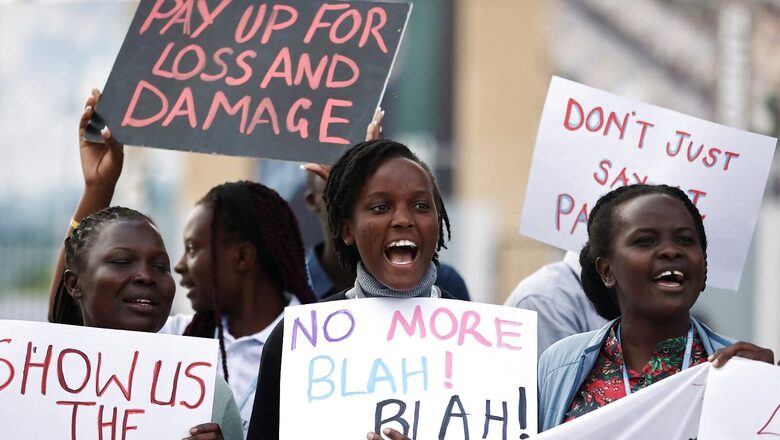
views
Just ahead of the last day of talks at Sharm-El-Sheikh in Egypt on Friday, the United Nations published the first draft of the climate deal, which gives a sneak-peek into what could actually constitute the final agreement. With representatives from countries still far apart on some key issues, including the phasing-down of all fossil fuels and providing compensation to vulnerable nations, the summit, it seems, could fall short of achieving what it had set out to when it began on November 6.
Decade-Long Wait For Climate Finance
The draft on cover decisions makes a reference to doubling of adaptation finance to $40bn a year by 2025, but it stops short of compelling the wealthy countries to increase support and align their funding flows with the 1.5 degree Celsius target. Instead, it just “urges” them to meet the long promised goal of $100 billion per year since 2020 and address the shortfall.
It has been over a decade since the rich nations, who continue to emit and disproportionately consume the global carbon budget, committed to providing $100 billion a year to vulnerable nations for climate action. However, their promises are yet to materialise. The estimates have now gone up by trillions of dollars. The Indian delegation has made it clear that it expects action from rich countries in terms of climate finance and technology transfer before they ask developing countries to up their ambition.
Where’s The Compensation For Vulnerable Nations?
After a spate of extreme weather events triggered by climate change, a proposal for a special fund for ‘loss and damage’ was expected to be the centre-point of this year’s COP. The fund seeks to compensate the world’s most vulnerable nations for the unavoidable damages that they have already incurred due to climate catastrophes in recent years. The idea is that since developed countries have been largely responsible for most of the ‘historical emissions’ that led to these disasters, they must compensate in present.
It was for the first time that COP had agreed to include the fund in the official agenda. But two weeks on, delegates from over 190 countries are still wrangling on whether rich should help the vulnerable cope with the brunt of climate change and, amid the schism, a formal agreement looks difficult. The draft climate deal released on Thursday has also just “welcomed” the inclusion of “loss and damage fund” into the official agenda, missing out on an early opportunity to help the vulnerable countries.
Silence On India’s Proposal for Phasing Out All Fossil Fuels
Reiterating the 2021 Glasgow Pact where all parties, including India, agreed for “phase down of unabated coal” and “phase out and rationalise inefficient fossil fuel subsidies”, the draft climate pact steers clear of making any specific mention to “gas and oil”. It is also silent on India’s proposal to “phase down” all fossil fuels and not just coal, which accounts for more than 50 per cent of the country’s overall energy needs.
Going into COP27, the Indian delegation led by Union Environment Minister Bhupender Yadav had told the Egypt Presidency that “selective singling out of sources of emissions, for either labelling them more harmful, or labelling them ‘green and sustainable’ even when they are sources of greenhouse gases, has no basis in the best available science”.
What Has India Said So Far?
India has continued to highlight its commitment to climate action. Just before going into COP, the government had submitted its revised Nationally Determined Contributions (NDCs). As promised by Prime Minister Narendra Modi at Glasgow in 2021, the country plans to achieve its net-zero target by 2070, and has joined 56 other nations in submitting its long-term plan on how the goal will be reached.
However, it has also made clear that the progress is subject to availability of requisite technology and climate finance whose estimate has now gone up by trillions of dollars. India has also emphasised that it remains one of the most vulnerable countries to climate change, despite its per capita emissions even today constituting only about one-third of the global average.
But as the conference heads into the final day, there is still time for another round of revisions before the final climate deal is finalised. With India at the table, as a key negotiator with its proposals on phase down of all fossil fuels, it remains to be seen if the global delegates will make some headway and make up for the lost opportunities for climate action.
Read all the Latest India News here




















Comments
0 comment